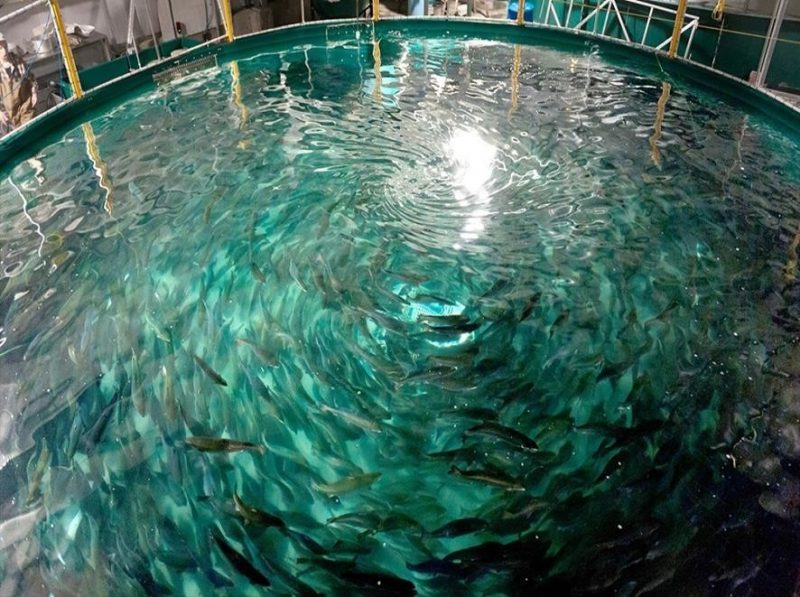Study shows challenges facing land-based salmon farms in B.C.
New aquaculture technologies, as well as conventional net-pen systems, will all play a role in contributing to global production of salmon states new government report
By Fabian Dawson
SeaWestNews
Transitioning all open-net fish farms in British Columbia to land-based salmon farms operations is fraught with challenges, states a new government report that examined four emerging salmon farming production systems.
The long awaited report said that land-based recirculating aquaculture system (RAS) technology requires the use of large amounts of land, water, and power, and thus has a significant environmental footprint, in particular greenhouse gas emissions.
Other challenges to land based RAS grow-out facilities include the global shortage of a trained workforce, fish health, broodstock development, stocking densities, and financial risks.
The report suggests that it will be at least another two years before we understand whether commercial-scale land-based operations can be profitable, said John Paul Fraser, the executive director of the B.C. Salmon Farmers Association.
The State of Salmon Aquaculture Technologies study, was announced in December of 2018 and was expected to be released last summer. It was only released yesterday as Canadian aquaculture leaders were meeting with MPs in Ottawa.
The study examined the risks and opportunities of the most promising emerging technologies for salmon farming in B.C.; explored the financial, environmental and social elements of emerging aquaculture technologies, and highlighted some of the ways to incent the adoption of these new technologies, including how other countries have incented adoption.
The study explored four technology options: RAS land-based closed-containment; floating closed containment; offshore technologies; and hybrid systems, which combine both land and marine-based systems.
“Land-based RAS and hybrid systems are the two technologies ready for commercial development in B.C., while floating closed containment requires 2-5 years of further review, and offshore technologies may require 5 to 10 years of review,” the report stated.
“The new technologies discussed in this report, as well as conventional net-pen systems, will all play a role in contributing to global production of salmon products.”
Fraser said the hybrid system, which involves extending the amount of time young fish spend in land-based hatcheries before being moved to ocean pens, is particularly promising in the near-term, and something B.C. salmon farmers are actively pursuing.
“We are confident land-based aquaculture can be part of the solution to responsibly raising the fish needed to feed our hungry world in the future, alongside ocean-based farming,” said Fraser.
“We agree with many of the recommendations in the report, particularly the recommendation that national legislation and policy be crafted to nurture innovation in sustainable aquaculture. We are committed to working with all our partners and regulators to make that reality,” he said.
The Department of Fisheries and Oceans (DFO) said the study is an important next step toward an Aquaculture plan that is evidence-based and responsible.
Last year, the Trudeau-led Liberal party, made a last minute election campaign pledge to phase out ocean net pen salmon farming in B.C. by 2025, reflecting a well-financed campaign by the anti-ocean fish farming lobby. Similar pledges were also made earlier by the NDP and Green parties.
In the wake of the Liberal election pledge, global aquaculture experts, scientists and the industry labelled the move as unrealistic, reckless and destructive because growing the global supply of salmon on land would require the same amount of energy per year needed to power a city of 1.2 million people and contribute to higher CO2 emissions.
Raising land based Atlantic salmon also costs 12 times more than ocean farming, they said
Last month, Canada’s new Fisheries Minister Bernadette Jordan told SeaWestNews in an interview that the 2025 deadline in her mandate letter is the date to “come up with a plan” and is not about getting all open-net salmon farms out of the ocean in five years.
Seafood farming provides 26,000 full-time jobs across Canada. It generates $5.4 Billion in economic activity in Canada. Salmon farming makes up close to 90% of this economic value.
In British Columbia, farm-raised salmon is the province’s highest valued seafood product, the province’s top agricultural export, and generates over $1.5-billion towards the B.C. economy, supporting about 7,000 jobs.
Linkedin image of a land-based salmon farm
Some of our earlier reporting on this issue
Canada’s Fisheries Minister clarifies her B.C. aquaculture mandate
The salmon farming flip-flop by the Liberals in four years
Election vow to move fish farms out of the oceans unrealistic says global expert
Liberal election platform betrayal will destroy our livelihoods in the aquaculture industry
It’s not about wild first, it’s about votes first
Inside Trudeau’s fishy political promise that will be a net loss for Canadians

